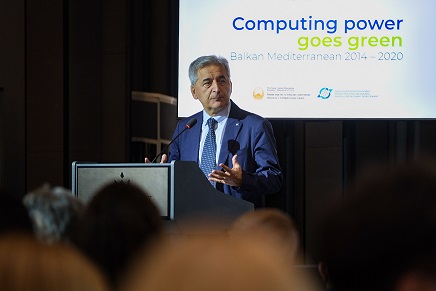It is a national priority to create plans and roadmaps for digital transformation, and finance initiatives for digitalization of enterprises. It is also important for Macedonia to focus on green digitalization and creating ecologically sustainable digital infrastructures, said participants during Wednesday’s conference “Go Green: Securing Digital Economic Sustainability.”
The conference was organized by the Bureau for Regional Development within “Computing power goes green” project, financed by the EU’s “INTERREG Balkan-Mediterranean 2014-2020” which is being implemented from October 2021 and funded by the BalkanMed Program.
“This is the first innovative project implemented in Macedonia. Within the framework of the project, we have mapped, analyzed, and described factors, which support and prevent the adoption of green digitalization measures, a focused assessment of the country, and a report on the identification of resources and measures. The goal of the conference is to establish a digitally ecological sustainability on an international, national, and local level, because we can all contribute to green digitalization,” said Bureau for Regional Development director Ramiz Rexhepi.
Minister of Local Self-Government Risto Penov stated that digital transformation is a global trend that has to be followed.
“The public sector challenges are great. I am pleased by the fact that there is an awareness of the need for a more dynamic transformation of the process management method, which is why we need new tools and knowledge, and the Bureau achieves that with EU’s support. I expect though such projects to continue the trend of adaption and faster transformation of both the public and business sectors, and our full adaption to EU goals and UN’s global development goals,” Penov said.
During the conference, two panel discussions were held on the topics of “Computing Power Goes Green-Go Green” and “Challenges of the Application of Green Digitalization in the Private and Social Sectors.”
The project’s partners are Greece, Albania, Cyprus, and Bulgaria, and is financed by the Interreg BalkanMed Program 2014 – 2020.





Comments are closed for this post.